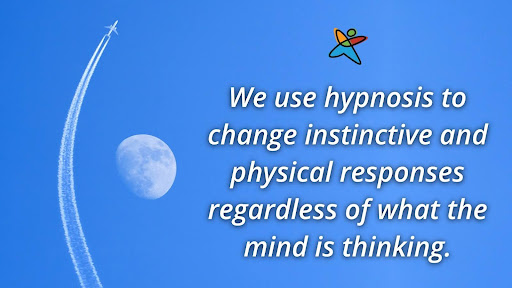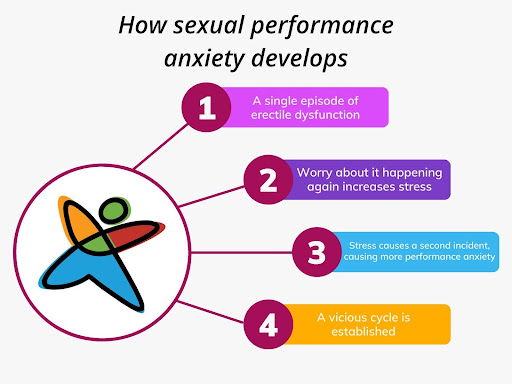Can Hypnosis Help Erectile Dysfunction?
Why hypnotherapy may be the very best cure for psychological impotence
 Hypnotherapy works with the part of the mind responsible for getting and maintaining an erection - the unconscious mind.
Hypnotherapy works with the part of the mind responsible for getting and maintaining an erection - the unconscious mind.Oh no! It's happened (or, rather, not happened) again!
It can feel humiliating, even terrifying, not to be able to 'perform' sexually. And while most men experience times when they're unable to get an erection during sex, knowing that it's common doesn't take away from the personal sense of failure and shame that so often tracks alongside erectile dysfunction (ED).
But there is hope!
First, we need to ask...
Why is the erectile dysfunction occurring?
An inability to get or maintain an erection may simply be a side effect of over-tiredness, too much alcohol, or porn addiction.1 Or it might be a symptom of relationship difficulties or even a loss of attraction to your partner.
Quick aside: A client struggling with impotence once told me that he would imagine someone else when making love to his wife! Strange as it sounds, this was a stepping stone for him to, as he put it, 'get back on my game'... and pretty soon he began to feel aroused by his wife again. Whatever works for you!
I've treated many men for erectile dysfunction over the years using hypnosis, but before we get to that we need to consider the potential causes of erectile dysfunction - which may be physical.
Possible physical causes for impotence
Erectile dysfunction may be a side effect of diabetes, high blood pressure, other circulatory issues, or low testosterone levels. Side effects of medications such as SSRI antidepressants can also cause impotence in some men.2
And of course you are much more likely to have a strong, healthy sex drive throughout your life if you eat healthily and exercise regularly.
So if you've had recurrent periods of impotence, it's important to talk to a doctor first and foremost.
Interestingly, we know that erections can coincide with REM (rapid eye movement) sleep, which is one reason men often wake up with 'morning wood'. So here's an important question to ask yourself, and one that might tell you whether erectile dysfunction is more of a medical or psychological issue...
Do you ever have morning wood?
'Morning wood', or, as medics call it, nocturnal penile tumescence, happens during REM sleep. It even happens to male foetuses in the womb! It also has a female counterpart, called nocturnal clitoral erection. This may be why some couples awaken in the night for wild lovemaking!
As I've said, 'morning wood' erections happen during REM sleep, when certain areas of the brain and body are activated. Because we experience more REM in the early hours of the morning, before and as we awaken, men will sometimes wake up with an erection if they awaken during or just after a state of REM sleep.
So, if you never experience a morning (or middle of the night) hard-on, it may be that any erectile dysfunction you've been experiencing has a physical cause.
But if you do sometimes wake up with an erection, then any erection difficulties you may have been experiencing during sex are more likely to be related to performance-based stress and the psychological and physical impacts of that. And that's where hypnosis can help hugely.
So why does stress interfere with sexual performance?
How does stress interfere with sexual performance?
There are good reasons why sex can quite easily come to be associated with fear rather than pleasure.
During stress, specifically fear, sexual responses are meant to 'switch off'. Getting an erection will be the last thing your body is interested in if you are threatened by muggers or being chased by a tiger!

In fact, all bodily processes that are not essential to immediate survival become sidelined during times of threat, be it real or perceived. Immune function, digestion, salivation, methodical clear thought - all these are sidelined during high stress. This is actually a very efficient mechanism in the short term, during actual physical threat.
But the switching off of digestion or strong immune function or sexual response - valid as they may be during fight or flight - become problems in their own right if we're stressed long term, resulting in digestive problems such as irritable bowel syndrome (IBS), difficulty thinking, impaired immune function, and sexual unresponsiveness. This is why simply relaxing deeply every day for 25 minutes can help improve not just immunity and cognition, but sexual function too.
So erections are supposed to not happen during the stress of a real emergency - you need all your blood in your major muscles for fighting and/or running! The problem is that our minds can tag things as a threat when in actual fact they are not threatening at all. Hypnosis, used well (what we call 'Uncommon Hypnosis'), is all about changing emotional associations in the mind so that relaxation (and, in the case of sex, excitement) quickly replaces any fear.
Changing psychological associations fast with hypnosis
Psychologists call an unhelpful mental association with some given situation a 'faulty pattern match'. This is in direct contrast to an adaptive pattern match, which is a helpful association.
If a baby is presented with a nipple and it sucks, for example, that's a useful and adaptive match: the baby is responding in a helpful way to the pattern of being presented with the mother's nipple.
If, on the other hand, the baby cries instead of sucking or tries to suck on a finger placed in its mouth, these are what we call 'faulty pattern matches'. A phobia is also a faulty pattern match. One client I worked with hypno-therapeutically had a terror of belly buttons; another feared paper bags! The mind was tagging the wrong things as threatening. But there's something else important here.
What performance anxiety really is
The faulty pattern matching that maintains psychologically caused erectile dysfunction isn't a cognitive issue so much as an instinctive issue. Sure, trying to catch and challenge thoughts as with cognitive behavioural therapy (CBT) may have some value, but the performance anxiety of erectile dysfunction has much more to do with an instinctively learned faulty pattern match than 'thinking wrong'.
We use hypnosis to change instinctive and physical responses regardless of what the mind is thinking.

We have to deal with the problem on the level at which it exists. This may be one reason why CBT therapy is a whopping 70% more effective when used alongside hypnotic treatment.
Ivan Pavlov trained dogs to salivate upon exposure to specific shapes or sounds by repeatedly feeding them at the same time as showing the shape or sounding the bell. Eventually, the dogs would salivate after just being exposed to the shape or sound, without any food being presented to them! In other words, Pavlov had instilled a faulty pattern match. The dogs weren't thinking anything - they were simply conditioned through their unconscious feelings.
All phobias are faulty pattern matches, and many fetishes are too. But so is performance anxiety. They all arise on an unconscious level.
So how does this work in the case of performance anxiety?
The loss of spontaneity and the curse of overthinking
If a man doesn't achieve an erection during one sexual encounter (perhaps because he's tired, or intoxicated, or for whatever reason) he may then feel it's bound to happen again. For some, just a single experience of feeling anxious and not getting an erection can turn into a repeating pattern. In the mind, sex becomes associated with pressure and anxiety, which in turn interferes with sexual responsiveness. And so the vicious circle begins!

What was first experienced through tiredness or alcohol has now become a faulty association so that, even in the absence of those factors, a man can find himself unable to achieve an erection. Sex becomes linked to fear and worry as to whether he can 'perform'. Rather than just being in the moment, he starts to analyze and worry.
Hypnosis is about working with the unconscious mind to change the way we feel directly. Good hypnosis takes the worry away and brings the flowing, in-the-zone spontaneity back so that sex can be wonderfully enjoyed again.
So how does hypnosis do this?
How hypnotherapy reaches the parts other therapies can't
Much of our experience is unconsciously produced. You might blush when you're embarrassed, but you didn't decide consciously to do that... any more than someone who panics when about to deliver a public presentation decided to panic. And we certainly don't decide to get or not to get an erection!
All these responses are produced by the unconscious mind: the part of you outside of immediate conscious control. But hypnosis is a form of communication which is, par excellence, the best method of altering these unconscious responses.
So, to summarize, if you're struggling with erectile dysfunction:
- Get checked out medically and prioritize a healthy lifestyle.
- Ascertain whether erectile dysfunction is physical or a learned 'faulty pattern match' by looking out for 'morning wood'.
- Decide whether a feeling of pressure, stress, or performance anxiety could be interfering with your sexual responsiveness, and...
- If so, use ED hypnosis to help your unconscious mind update itself so that it responds to future sexual experiences in the best possible ways - which means with feelings of comfort, excitement, and a natural build-up of desire during lovemaking.
Because hypnosis helps rapidly change learned associations, sex can quickly turn from a source of anxiety into the natural, loving, wonderful, and intense experience it's supposed to be.
References
- Park BY, Wilson G, Berger J, Christman M, Reina B, Bishop F, Klam WP, Doan AP. Is Internet Pornography Causing Sexual Dysfunctions? A Review with Clinical Reports. Behav Sci (Basel). 2016 Aug 5;6(3):17. doi: 10.3390/bs6030017. Erratum in: Behav Sci (Basel). 2018 Jun 01;8(6): PMID: 27527226; PMCID: PMC5039517.
- Antidepressants: Which cause the fewest sexual side effects? Daniel K. Hall-Flavin, M.D. Jan 25, 2020.






